LF Deveopment for Future Needs handout
2024年高三英语未来发展趋势练习题20题

2024年高三英语未来发展趋势练习题20题1. With the development of technology, learning English will become more _____.A.easyB.difficultC.expensiveD.time-consuming答案:A。
本题考查形容词的辨析。
随着科技的发展,学习英语会变得更容易,选项 A 符合题意。
选项B“difficult”(困难的)与科技发展使学习更便捷的趋势不符;选项C“expensive”( 昂贵的)题干中未提及费用问题;选项D“time-consuming” 耗时的)科技一般会使学习更高效,减少耗时。
2. In international communication, English is likely to _____.A.become less importantB.remain dominantC.be replaced by other languagesD.change significantly答案:B。
本题考查对英语在国际交流中地位的理解。
目前英语在国际交流中占据重要地位,短时间内仍会保持主导地位,选项 B 正确。
选项A“become less important”( 变得不那么重要)不太符合实际情况;选项C“be replaced by other languages” 被其他语言取代)可能性较小;选项D“change significantly”( 发生重大变化)题干中没有足够信息表明会有重大变化。
3. Technology can help students improve their English _____ skills.A.readingB.writingC.speakingD.listening答案:A。
科技可以通过提供电子书籍、在线阅读材料等方式帮助学生提高阅读技能,选项 A 正确。
高三英语未来发展单选题70题(答案解析)

高三英语未来发展单选题70题(答案解析)1.The future of English learning will be greatly influenced by technology. We can expect more ______ tools to help us improve our language skills.A.advancedB.primitiveC.outdatedD.ineffective答案:A。
本题考查形容词辨析。
“advanced”表示先进的,符合科技发展对英语学习带来更多先进工具的语境。
“primitive”原始的;“outdated”过时的;“ineffective”无效的,均不符合未来科技影响英语学习的积极场景。
2.With the development of artificial intelligence, English learning apps will become even more ______.elessB.helpfulC.harmfulD.meaningless答案:B。
“helpful”有用的,人工智能的发展会使英语学习app 更有用。
“useless”无用的;“harmful”有害的;“meaningless”无意义的,都与科技发展的积极影响相悖。
3.In the future, virtual reality technology may provide ______language learning environments.A.realisticB.unrealisticC.imaginaryD.fantastic答案:A。
未来虚拟现实技术可能提供真实的语言学习环境。
“realistic”真实的,符合语境。
“unrealistic”不现实的;“imaginary”想象中的;“fantastic”极好的但不太能准确体现语言学习环境的特点。
inclusive development 英文解释

inclusive development 英文解释全文共6篇示例,供读者参考篇1What is Inclusive Development?Hi there, friends! Today, I'm going to talk to you about something called "inclusive development." It's a really important idea that we all need to understand, especially as we grow up and become part of the world.Inclusive development means making sure that everyone in a community or society has the opportunity to participate, contribute, and benefit from the progress and growth that's happening. It's about making sure that no one is left behind, and that everyone has a fair chance to live a good life, no matter who they are or where they come from.Let me give you an example. Imagine there's a new park being built in your neighborhood. Inclusive development would mean that this park is designed in a way that makes it accessible and enjoyable for all kinds of people. There would be ramps and smooth paths for people who use wheelchairs or have trouble walking. There would be equipment and play areas that are safeand fun for children of all ages and abilities. There would be shaded areas for people who need to stay out of the hot sun, and maybe even special features for people with visual or hearing impairments.The idea is that this park should be a place where everyone in the community can come together, play, and have a good time, without anyone feeling left out or like they don't belong.But inclusive development isn't just about parks and playgrounds. It's about making sure that all aspects of society –like education, healthcare, job opportunities, anddecision-making processes – are designed and organized in a way that includes and benefits everyone, regardless of their gender, race, religion, disability, or economic situation.For example, in a school that practices inclusive development, there would be programs and resources in place to support students with different learning needs, backgrounds, and abilities. The teachers would be trained to understand and accommodate different learning styles, and the curriculum would reflect and celebrate the diversity of cultures and perspectives within the student body.In a workplace that practices inclusive development, there would be fair hiring practices, equal opportunities foradvancement, and policies to prevent discrimination and harassment. The workplace would be designed to be accessible and comfortable for people with different physical and mental abilities, and there would be resources and support systems in place to help employees balance their work and personal responsibilities.Inclusive development is important because it helps to create a society that is more just, more equal, and more sustainable for everyone. When everyone has the opportunity to participate and contribute, we can tap into the full potential of our diverse perspectives, talents, and experiences. We can learn from each other, support each other, and work together to solve problems and make the world a better place.At the same time, inclusive development helps to reduce poverty, inequality, and social tensions. When people feel included, valued, and respected, they are more likely to feel a sense of belonging and ownership in their communities. They are more likely to participate in positive ways, to work hard, and to contribute their skills and ideas for the greater good.But the benefits of inclusive development are so worth it. When we work together to create a world where everyone has a fair chance to succeed and thrive, we all win. We create astronger, more vibrant, and more resilient society that can tackle the big challenges we face – like climate change, poverty, and conflict – in a more effective and sustainable way.So, my friends, as you grow up and start to think about your role in the world, remember the importance of inclusive development. Look for ways to support and promote inclusion in your schools, communities, and future workplaces. Be kind and respectful to everyone, no matter their differences. And always strive to create spaces and opportunities where everyone feels valued, heard, and empowered to reach their full potential.Together, we can build a world where no one is left behind, and where everyone has the chance to live a happy, healthy, and fulfilling life. That's what inclusive development is all about.篇2What Does Inclusive Development Mean?Have you ever felt left out or like you didn't belong somewhere? Maybe you weren't picked for a team in gym class or your classmates didn't invite you to a party. It doesn't feel good, does it? Inclusive development is all about making sure everyone feels included and has the same opportunities, no matter who they are or where they come from.Let me give you an example. Imagine there's a new park being built in your town. The people in charge of building the park want to make sure it's a place where all kids can play and have fun, regardless of if they are a boy or girl, tall or short, use a wheelchair or not. That's inclusive development!They would make sure to include playground equipment that kids of all abilities can use, like ramps and swings with special seats. The restrooms would have amenities for kids with different needs. There would be shaded areas for kids who need to get out of the sun. And the park would be designed so kids of all backgrounds feel welcome and safe.Inclusive development means thinking about everyone's needs and making sure no one is excluded or left behind when new things are created or decisions are made that affect a community. It applies to all kinds of areas - schools, hospitals, roads, businesses, and more!Why Is It Important?You might be wondering why inclusive development matters. Well, imagine if things weren't designed to include everyone. Some kids wouldn't be able to go to school, play at parks, or access basic services like healthcare just because of who they are. That doesn't seem very fair, does it?When communities practice inclusive development, it means more opportunities for everyone to learn, grow, and achieve their dreams. It helps create a society where people's differences are respected and valued. After all, we're all human and deserve the same rights and freedoms.Inclusive development also makes communities stronger. When everyone can participate, you get more ideas, perspectives, and contributions from all kinds of people. That leads to better solutions for challenges a community might face.What Does It Look Like?So what might inclusive development look like in real life? Here are some examples:Schools: Classrooms that have learning materials in multiple languages, accommodations for students with disabilities, gender-neutral bathrooms, and lessons that teach about different cultures.Hospitals: Providing medical care and information in the languages patients speak at home, having amenities for patients with diverse needs, and training staff on cultural sensitivity.Public Transit: Having buses, trains and stations that are accessible for people using wheelchairs, with audio篇3What is Inclusive Development?Hey there, kids! Have you ever heard the phrase "inclusive development"? It's a big and important idea that we should all understand. Let me break it down for you in a way that's easy to grasp.Imagine you have a group of friends, and you're planning a fun day at the park. Some of your friends might want to play soccer, while others prefer to have a picnic or go on the swings. If you only focused on one activity, like soccer, some of your friends might feel left out or unhappy. That's not very fair, is it?Inclusive development is all about making sure that everyone in a community, a city, or even a whole country, has the opportunity to be involved, to have their voices heard, and to benefit from the good things happening around them. It's like planning a day at the park where everyone gets to do something they enjoy.Let me give you an example. In some parts of the world, there are communities where not everyone has access to good schools, clean water, or proper healthcare. Inclusivedevelopment means working hard to make sure that these basic needs are met for all people, regardless of their circumstances.Another example is when new buildings or parks are being planned in a city. Inclusive development means considering the needs of people with disabilities, so that they can access and enjoy these new spaces too. It's about making sure no one is left behind.But inclusive development isn't just about meeting basic needs or making things accessible. It's also about giving everyone a chance to contribute their ideas, skills, and talents to make their communities better. After all, everyone has something valuable to offer, right?Imagine if you and your friends were asked to plan a fun school event. If you only listened to a few people's ideas, the event might not be as exciting or enjoyable for everyone. But if you included everyone's input and ideas, you could create篇4Inclusive Development: Making Progress for Everyone!Have you ever felt left out or like you didn't have the same opportunities as others? Well, that's not fair, and it's somethingthat people around the world are trying to change. This idea of making sure everyone can participate and benefit from progress is called "inclusive development."Imagine a playground where some kids get to play on all the cool equipment, while others are stuck on the sidelines. That wouldn't be much fun, would it? Inclusive development is like making sure the playground is designed so that every child, no matter their abilities or background, can join in the games and activities.Just like on the playground, in our communities and societies, some people face more challenges or barriers than others. Maybe it's because of their gender, the color of their skin, their religion, or a disability they have. Inclusive development means recognizing these differences and making sure everyone has a fair chance to learn, work, and live a good life.Let me give you an example. In some parts of the world, girls don't have the same opportunities to go to school as boys. That's not fair, is it? Inclusive development would mean making sure that girls and boys alike can access quality education and learn the skills they need to reach their full potential.Or think about people with physical disabilities. Inclusive development means making buildings, transportation, andpublic spaces accessible to everyone, including those who use wheelchairs or have other mobility challenges.Another important part of inclusive development is making sure that people from different backgrounds and cultures are respected and included in decision-making processes. After all, diverse perspectives and experiences can lead to better solutions for everyone.Inclusive development isn't just about being nice or fair (although those are good reasons too!). It's also about making sure that no one gets left behind as our world progresses and changes. When everyone can participate and contribute, communities and societies become stronger, more prosperous, and more innovative.Imagine a world where everyone, no matter their circumstances, has a chance to learn, grow, and achieve their dreams. That's the goal of inclusive development – progress that benefits us all, not just a few.So, the next time you see someone being excluded or treated unfairly, remember the idea of inclusive development.It's about making sure everyone has a seat at the table, a voice that's heard, and a chance to be part of the journey towards a better future for all.After all, progress is a lot more fun and meaningful when we get to share it with everyone, don't you think?篇5Inclusive Development - Everyone Counts!Hello friends! Today, I want to tell you all about something really important called "Inclusive Development." It's a big term, but don't worry, I'll explain it in a way that we can all understand.Inclusive Development means that everyone should have the chance to grow and succeed, no matter who they are or where they come from. It's about making sure that nobody is left behind and that everyone has equal opportunities.Inclusive Development starts with education. Every child, regardless of their background, should have access to a good quality education. This means that schools should be welcoming and inclusive for students with different abilities, learning styles, and backgrounds. It's important to create an environment where everyone feels safe, respected, and valued.Inclusive Development also means that everyone should have access to basic necessities like clean water, nutritious food, and healthcare. It's not fair if some people have these things andothers don't. We need to work together to make sure that everyone's basic needs are met, so that everyone can live a healthy and happy life.Another important aspect of Inclusive Development is creating job opportunities for everyone. It means that people should be able to find work and earn a fair wage, regardless of their gender, race, or disabilities. Inclusive Development is about creating a society where everyone can contribute their skills and talents, and where nobody is left behind.Inclusive Development is also about protecting our planet. We need to take care of the environment so that future generations can enjoy it too. This means using energy wisely, reducing waste, and finding ways to live in harmony with nature. We can all do our part by recycling, conserving water, and planting trees.So, how can we promote Inclusive Development? Well, first of all, we need to learn about different cultures and respect diversity. It's important to be kind and inclusive to others, even if they are different from us. We should celebrate our differences and learn from each other.We can also help by volunteering and supporting organizations that work towards Inclusive Development. We candonate books, clothes, or toys to children who are less fortunate. We can also raise awareness about the importance of Inclusive Development by organizing events or talking to our friends and family about it.Remember, Inclusive Development is about making sure that everyone counts. It's about creating a world where everyone has equal opportunities and where nobody is left behind. So let's work together to promote Inclusive Development and make the world a better place for all of us!I hope you all understand what Inclusive Development means now. Let's be inclusive, kind, and make sure that everyone has a chance to shine. Together, we can make a difference!Take care, my friends!Love,[Your Name]Word Count: 450 words篇6What is Inclusive Development?Have you ever felt left out or like you didn't belong? Maybe you weren't invited to a friend's birthday party, or maybe you couldn't join a game because of a disability. That's a awful feeling, isn't it? Nobody likes to be excluded or treated unfairly.Well, inclusive development is all about making sure that everyone, no matter who they are or what their circumstances are, has the opportunity to participate and benefit from the progress and growth happening in their community, country, or even the whole world.It's like when you're in a classroom, and the teacher wants everyone to understand the lesson, so they try to explain it in different ways and use different materials to help all the students learn. Inclusive development is kind of like that, but on a much bigger scale!Let me give you some examples of what inclusive development means:Including people with disabilities: Imagine if your school built a new playground, but the equipment was designed in a way that made it difficult or impossible for kids in wheelchairs or with other disabilities to play on it. That wouldn't be very inclusive, would it? Inclusive development means making sure that public spaces, buildings, transportation, and eventechnology are accessible to everyone, regardless of their physical or mental abilities.Giving equal opportunities to girls and boys: In some parts of the world, girls don't have the same chances to go to school or get good jobs as boys do. Inclusive development means making sure that girls and boys have equal access to education, healthcare, and employment opportunities, so that everyone can reach their full potential.Supporting people living in poverty: Sometimes, people living in very poor communities don't have access to basic things like clean water, electricity, or good schools. Inclusive development tries to improve the living conditions and provide more opportunities for these people, so that they can have a better quality of life and a chance to break out of the cycle of poverty.Protecting the environment: Believe it or not, inclusive development also considers the impact of our actions on the environment. After all, if we damage the planet too much, it will be harder for future generations to have a good life. Inclusive development means finding ways to grow and develop while still protecting the natural world around us.So, in a nutshell, inclusive development is all about making sure that no one is left behind. It's about creating a world where everyone, regardless of their gender, abilities, income, or background, has a fair chance to participate, learn, work, and live a good life.It's kind of like a big, global game of tag – but instead of trying to exclude people, the goal is to include everyone and make sure no one is left out or treated unfairly.So, the next time you see someone being excluded or treated unfairly, remember the importance of inclusive development, and think about how you can help make things more inclusive and fair for everyone.。
未来职业发展的重要因素英语作文
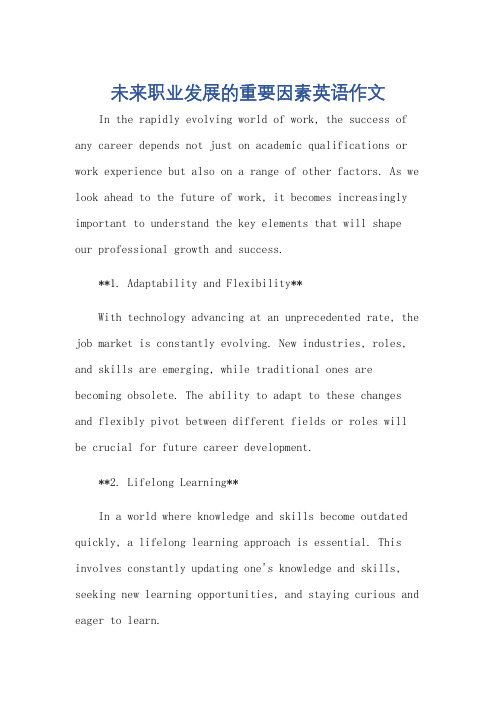
未来职业发展的重要因素英语作文In the rapidly evolving world of work, the success of any career depends not just on academic qualifications or work experience but also on a range of other factors. As we look ahead to the future of work, it becomes increasingly important to understand the key elements that will shape our professional growth and success.**1. Adaptability and Flexibility**With technology advancing at an unprecedented rate, the job market is constantly evolving. New industries, roles, and skills are emerging, while traditional ones are becoming obsolete. The ability to adapt to these changes and flexibly pivot between different fields or roles will be crucial for future career development.**2. Lifelong Learning**In a world where knowledge and skills become outdated quickly, a lifelong learning approach is essential. This involves constantly updating one's knowledge and skills, seeking new learning opportunities, and staying curious and eager to learn.**3. Technological Proficiency**As technology becomes increasingly integral to all aspects of work, proficiency in areas like artificial intelligence, data analytics, and cloud computing will be key. Understanding how to use these tools effectively and efficiently will be a major advantage in the job market. **4. Soft Skills**In addition to technical skills, soft skills like communication, teamwork, leadership, and problem-solving are becoming increasingly important. These skills are critical for navigating the complex social and interpersonal landscapes of the workplace.**5. Entrepreneurial Mindset**With the rise of the gig economy and the increasing importance of side hustles and side projects, having an entrepreneurial mindset is becoming increasingly valuable. This involves being able to identify opportunities, take initiative, and create value in new and innovative ways. **6. Global Perspective**In an increasingly globalized world, having a global perspective and understanding of different cultures and perspectives is crucial. This not only helps in international business but also in building inclusive and diverse teams.**7. Sustainability and Ethics**As companies and organizations become more aware of their social and environmental impact, sustainability and ethics are becoming increasingly important. Future careers will require a strong commitment to these values and the ability to integrate them into work practices.**8. Emotional Intelligence**Emotional intelligence, or the ability to understand and manage one's own emotions and those of others, is becoming increasingly important in the workplace. It is crucial for effective communication, conflict resolution, and leadership.In conclusion, the future of career development will be shaped by a range of factors, including adaptability, lifelong learning, technological proficiency, soft skills,entrepreneurial mindset, global perspective, sustainability and ethics, and emotional intelligence. By investing in these areas now, individuals can prepare themselves for success in the rapidly evolving world of work.**未来职业发展的重要因素**在职业世界迅速演变的今天,一个人的职业成功不仅取决于其学术资格或工作经验,还取决于其他一系列因素。
高三英语未来发展单选题30题

高三英语未来发展单选题30题1. Which of the following careers is likely to have a high demand in the future?A. TypistB. Data analystC. Factory workerD. Postman答案:B。
本题考查对未来职业需求的了解。
选项A“Typist”( 打字员)随着自动化技术的发展,需求逐渐减少。
选项C“Factory worker” 工厂工人)也面临着自动化生产带来的就业压力。
选项D“Postman” 邮递员)在数字化通信普及的背景下,需求相对降低。
而选项B“Data analyst” 数据分析师)在大数据时代,各行业对数据分析的需求不断增加。
2. If you want to have a stable career in the future, which of the following should you choose?A. Freelance writerB. TeacherC. Fashion designerD. Tour guide答案:B。
本题主要考察对职业稳定性的理解。
选项A“Freelance writer” 自由撰稿人)工作不稳定,收入不稳定。
选项C“Fashion designer”( 时装设计师)行业竞争激烈,稳定性相对较低。
选项D“Tourguide” 导游)受季节和旅游市场影响较大,稳定性不足。
而选项B“Teacher” 教师)通常有较为稳定的工作环境和收入。
3. The career that requires strong communication skills and creativity is _____.A. AccountantB. Marketing executiveC. ScientistD. Librarian答案:B。
本题考查不同职业所需的技能。
未来的就业方向英文作文
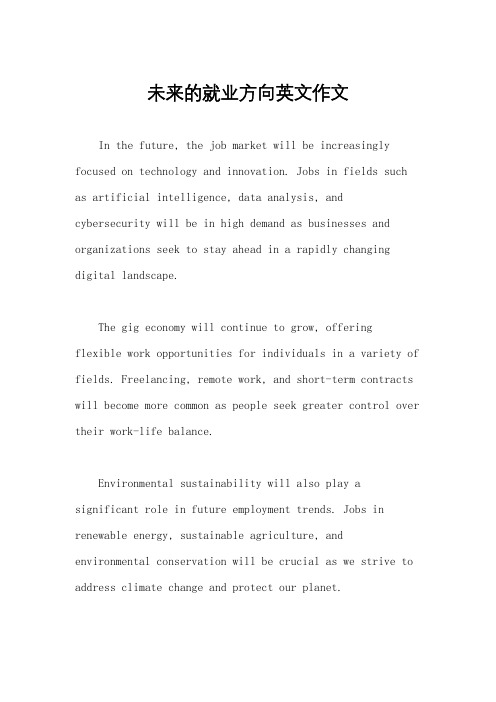
未来的就业方向英文作文In the future, the job market will be increasingly focused on technology and innovation. Jobs in fields such as artificial intelligence, data analysis, and cybersecurity will be in high demand as businesses and organizations seek to stay ahead in a rapidly changing digital landscape.The gig economy will continue to grow, offeringflexible work opportunities for individuals in a variety of fields. Freelancing, remote work, and short-term contracts will become more common as people seek greater control over their work-life balance.Environmental sustainability will also play a significant role in future employment trends. Jobs in renewable energy, sustainable agriculture, and environmental conservation will be crucial as we strive to address climate change and protect our planet.The healthcare industry will see continued growth, with an increasing demand for professionals in areas such as nursing, physical therapy, and mental health counseling. The aging population and advancements in medical technology will drive the need for skilled healthcare workers.Creativity and the arts will remain important in the future job market. Careers in design, entertainment, and content creation will continue to thrive as society values the importance of artistic expression and cultural enrichment.As automation and artificial intelligence become more prevalent, there will be a growing need for workers who can adapt and thrive in a digital economy. Skills such as critical thinking, problem-solving, and emotional intelligence will be highly sought after in a rapidly changing job market.Overall, the future of employment will be diverse and dynamic, offering opportunities for individuals with a wide range of skills and interests. Adaptability and awillingness to embrace new technologies and ways of working will be key to success in the ever-evolving job market.。
未来的就业方向英文作文
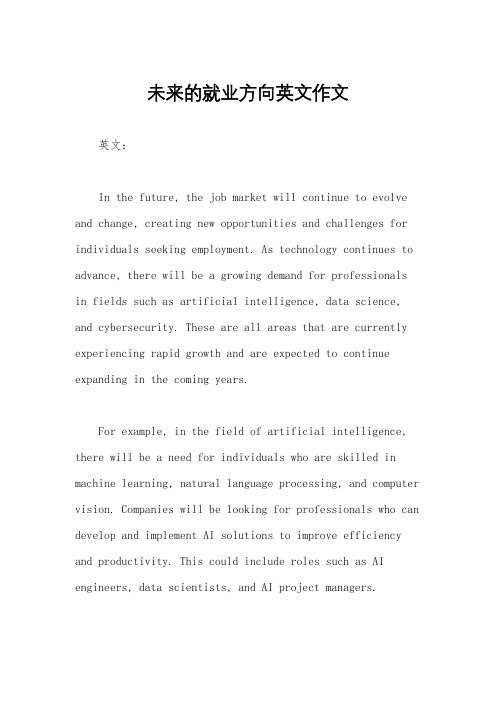
未来的就业方向英文作文英文:In the future, the job market will continue to evolve and change, creating new opportunities and challenges for individuals seeking employment. As technology continues to advance, there will be a growing demand for professionals in fields such as artificial intelligence, data science, and cybersecurity. These are all areas that are currently experiencing rapid growth and are expected to continue expanding in the coming years.For example, in the field of artificial intelligence, there will be a need for individuals who are skilled in machine learning, natural language processing, and computer vision. Companies will be looking for professionals who can develop and implement AI solutions to improve efficiency and productivity. This could include roles such as AI engineers, data scientists, and AI project managers.Similarly, the demand for individuals with expertise in data science will also increase. With the vast amount of data being generated by businesses and organizations, there will be a need for data scientists who can analyze and interpret this data to make informed business decisions. This could involve roles such as data analysts, data engineers, and business intelligence analysts.In the field of cybersecurity, there will be a growing need for professionals who can protect sensitive information and systems from cyber threats. This could include roles such as cybersecurity analysts, ethical hackers, and security architects. As cyber attacks become more sophisticated, the demand for individuals with cybersecurity skills will continue to rise.中文:未来,就业市场将继续发展和变化,为寻求就业的个人创造新的机遇和挑战。
未来发展的的英语作文
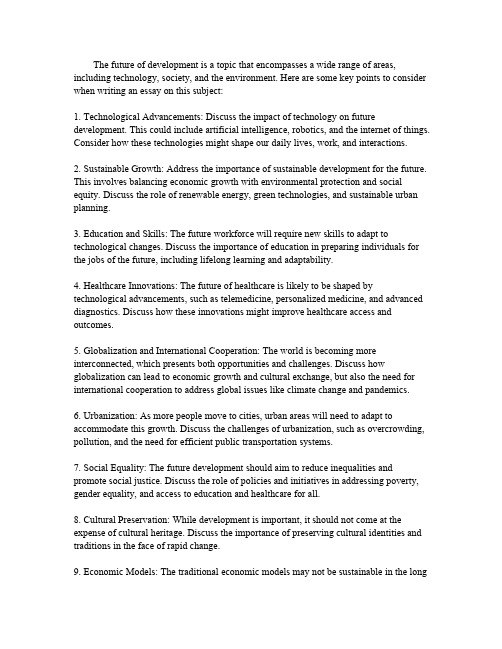
The future of development is a topic that encompasses a wide range of areas, including technology,society,and the environment.Here are some key points to consider when writing an essay on this subject:1.Technological Advancements:Discuss the impact of technology on future development.This could include artificial intelligence,robotics,and the internet of things. Consider how these technologies might shape our daily lives,work,and interactions.2.Sustainable Growth:Address the importance of sustainable development for the future. This involves balancing economic growth with environmental protection and social equity.Discuss the role of renewable energy,green technologies,and sustainable urban planning.cation and Skills:The future workforce will require new skills to adapt to technological changes.Discuss the importance of education in preparing individuals for the jobs of the future,including lifelong learning and adaptability.4.Healthcare Innovations:The future of healthcare is likely to be shaped by technological advancements,such as telemedicine,personalized medicine,and advanced diagnostics.Discuss how these innovations might improve healthcare access and outcomes.5.Globalization and International Cooperation:The world is becoming more interconnected,which presents both opportunities and challenges.Discuss how globalization can lead to economic growth and cultural exchange,but also the need for international cooperation to address global issues like climate change and pandemics.6.Urbanization:As more people move to cities,urban areas will need to adapt to accommodate this growth.Discuss the challenges of urbanization,such as overcrowding, pollution,and the need for efficient public transportation systems.7.Social Equality:The future development should aim to reduce inequalities and promote social justice.Discuss the role of policies and initiatives in addressing poverty, gender equality,and access to education and healthcare for all.8.Cultural Preservation:While development is important,it should not come at the expense of cultural heritage.Discuss the importance of preserving cultural identities and traditions in the face of rapid change.9.Economic Models:The traditional economic models may not be sustainable in the longterm.Discuss alternative economic systems that prioritize wellbeing over profit,such as circular economies or cooperative models.10.The Role of Governments and Corporations:Governments and corporations play a crucial role in shaping the future.Discuss their responsibilities in fostering innovation, regulating technology,and ensuring that development benefits all members of society. When writing your essay,ensure that you provide examples and evidence to support your points,and consider the potential challenges and solutions associated with each aspect of future development.。
未来发展的方向英语作文
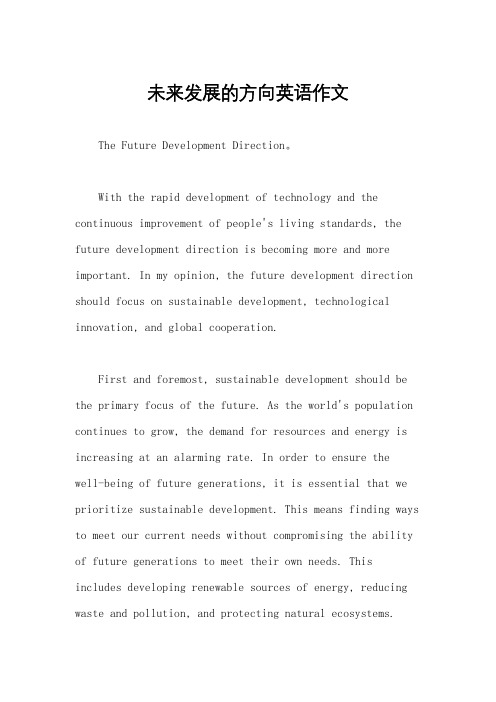
未来发展的方向英语作文The Future Development Direction。
With the rapid development of technology and the continuous improvement of people's living standards, the future development direction is becoming more and more important. In my opinion, the future development direction should focus on sustainable development, technological innovation, and global cooperation.First and foremost, sustainable development should be the primary focus of the future. As the world's population continues to grow, the demand for resources and energy is increasing at an alarming rate. In order to ensure thewell-being of future generations, it is essential that we prioritize sustainable development. This means finding ways to meet our current needs without compromising the ability of future generations to meet their own needs. This includes developing renewable sources of energy, reducing waste and pollution, and protecting natural ecosystems.Secondly, technological innovation will play a crucial role in shaping the future. The rapid advancement of technology has already transformed the way we live and work, and this trend is only going to continue. In order to stay ahead in the global economy, it is essential that we continue to invest in research and development, and support the growth of new industries. This will not only create new opportunities for economic growth, but also improve our quality of life and address pressing global challenges such as climate change, healthcare, and food security.Finally, global cooperation will be essential for addressing the complex challenges of the future. In an increasingly interconnected world, no country can solve these problems alone. We need to work together to find solutions that benefit all of humanity. This means building strong international partnerships, promoting dialogue and understanding between different cultures, and finding waysto address global issues such as poverty, inequality, and conflict.In conclusion, the future development direction should prioritize sustainable development, technological innovation, and global cooperation. By focusing on these key areas, we can build a better future for ourselves and for future generations. It will require hard work, cooperation, and a willingness to embrace change, but the potential benefits are enormous. Let's work together to create a brighter future for all.。
高三英语未来发展趋势单选题20题
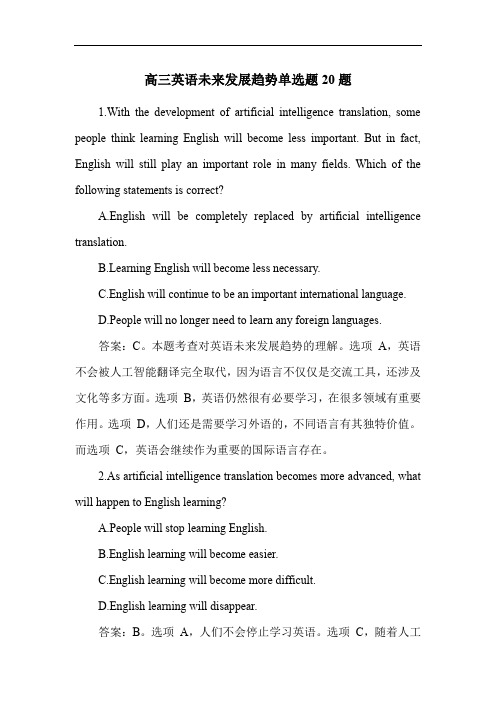
高三英语未来发展趋势单选题20题1.With the development of artificial intelligence translation, some people think learning English will become less important. But in fact, English will still play an important role in many fields. Which of the following statements is correct?A.English will be completely replaced by artificial intelligence translation.B.Learning English will become less necessary.C.English will continue to be an important international language.D.People will no longer need to learn any foreign languages.答案:C。
本题考查对英语未来发展趋势的理解。
选项A,英语不会被人工智能翻译完全取代,因为语言不仅仅是交流工具,还涉及文化等多方面。
选项B,英语仍然很有必要学习,在很多领域有重要作用。
选项D,人们还是需要学习外语的,不同语言有其独特价值。
而选项C,英语会继续作为重要的国际语言存在。
2.As artificial intelligence translation becomes more advanced, what will happen to English learning?A.People will stop learning English.B.English learning will become easier.C.English learning will become more difficult.D.English learning will disappear.答案:B。
英语作文-集成电路设计的未来发展趋势与人才需求
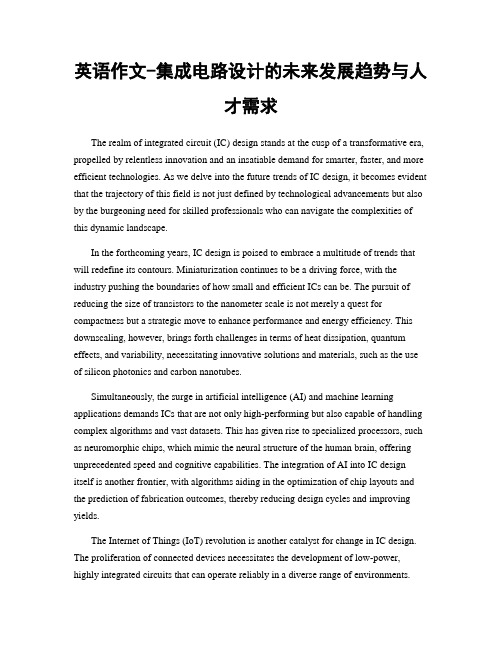
英语作文-集成电路设计的未来发展趋势与人才需求The realm of integrated circuit (IC) design stands at the cusp of a transformative era, propelled by relentless innovation and an insatiable demand for smarter, faster, and more efficient technologies. As we delve into the future trends of IC design, it becomes evident that the trajectory of this field is not just defined by technological advancements but also by the burgeoning need for skilled professionals who can navigate the complexities of this dynamic landscape.In the forthcoming years, IC design is poised to embrace a multitude of trends that will redefine its contours. Miniaturization continues to be a driving force, with the industry pushing the boundaries of how small and efficient ICs can be. The pursuit of reducing the size of transistors to the nanometer scale is not merely a quest for compactness but a strategic move to enhance performance and energy efficiency. This downscaling, however, brings forth challenges in terms of heat dissipation, quantum effects, and variability, necessitating innovative solutions and materials, such as the use of silicon photonics and carbon nanotubes.Simultaneously, the surge in artificial intelligence (AI) and machine learning applications demands ICs that are not only high-performing but also capable of handling complex algorithms and vast datasets. This has given rise to specialized processors, such as neuromorphic chips, which mimic the neural structure of the human brain, offering unprecedented speed and cognitive capabilities. The integration of AI into IC design itself is another frontier, with algorithms aiding in the optimization of chip layouts and the prediction of fabrication outcomes, thereby reducing design cycles and improving yields.The Internet of Things (IoT) revolution is another catalyst for change in IC design. The proliferation of connected devices necessitates the development of low-power, highly integrated circuits that can operate reliably in a diverse range of environments.This has led to the emergence of energy-harvesting ICs, which draw power from ambient sources, and the exploration of new paradigms like edge computing, where data processing is performed closer to the source, reducing latency and bandwidth demands.As these trends converge, the demand for IC design professionals is escalating. The industry seeks individuals who are not just adept at the technical aspects of design but also possess a holistic understanding of the market and application domains. This includes expertise in system-level design, knowledge of emerging materials and processes, proficiency in design automation tools, and an ability to work collaboratively across disciplines.Moreover, the IC design sector is becoming increasingly interdisciplinary, with a growing need for professionals who can bridge the gap between electrical engineering, material science, computer science, and even biology. This interdisciplinary approach is crucial for innovations like bioelectronics, where ICs interface with biological systems, opening up new avenues in healthcare and environmental monitoring.To prepare for these impending shifts, educational institutions and the industry must collaborate to cultivate a workforce that is equipped with both foundational knowledge and the agility to adapt to rapid changes. Curricula need to be updated regularly to reflect the latest developments, and opportunities for hands-on experience, such as internships and project-based learning, should be expanded.In conclusion, the future of IC design is a tapestry woven with threads of technological breakthroughs and the collective efforts of a diverse and skilled workforce. As we stand on the brink of this exciting frontier, it is the synergy between innovation and talent that will chart the course for a future where the possibilities are as limitless as the microcosmic universes etched onto silicon wafers. The journey ahead is not without its challenges, but with a concerted focus on nurturing talent and fostering collaboration, the IC design industry is well-positioned to thrive in the decades to come. 。
高三英语未来发展趋势单选题20题

高三英语未来发展趋势单选题20题1.In the future of technology, English will be used more widely in _____.A.artificial intelligence developmentB.traditional handicraft makingC.agricultural productionD.mining industry答案:A。
本题主要考查对未来科技领域中英语应用场景的理解。
选项A“artificial intelligence development”(人工智能发展)在未来科技中,英语会在这个领域被广泛应用。
选项B“traditional handicraft making” 传统手工艺制作)与科技关系不大,不太可能广泛使用英语。
选项C“agricultural production”( 农业生产)虽然可能会有一些科技应用,但不是英语广泛使用的主要领域。
选项D“mining industry” 矿业)同理也不是英语在未来科技中广泛使用的领域。
2.In the future technology era, people will communicate with each other in English through _____.A.letter writingB.telephone callsC.video conferencesD.pigeon post答案:C。
选项C“video conferences”(视频会议)在未来科技时代是人们用英语交流的常见方式。
选项A“letter writing”( 写信)比较传统,不是未来主要交流方式。
选项B“telephone calls”(电话)相对比较传统,未来可能会被视频会议等更先进的方式取代。
选项D“pigeon post” 信鸽传信)更是古老的方式,与未来科技不符。
未来的职业规划英文
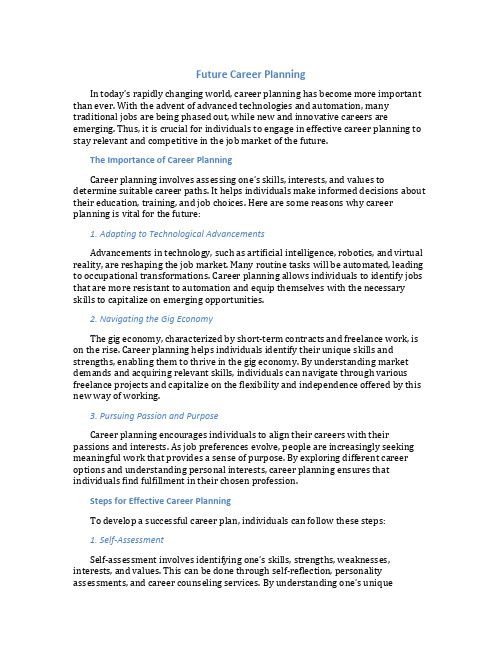
Future Career PlanningIn today’s rapidly changing world, career planning has become more important than ever. With the advent of advanced technologies and automation, many traditional jobs are being phased out, while new and innovative careers are emerging. Thus, it is crucial for individuals to engage in effective career planning to stay relevant and competitive in the job market of the future.The Importance of Career PlanningCareer planning involves assessing one’s skills, interests, and values to determine suitable career paths. It helps individuals make informed decisions about their education, training, and job choices. Here are some reasons why career planning is vital for the future:1. Adapting to Technological AdvancementsAdvancements in technology, such as artificial intelligence, robotics, and virtual reality, are reshaping the job market. Many routine tasks will be automated, leading to occupational transformations. Career planning allows individuals to identify jobs that are more resistant to automation and equip themselves with the necessary skills to capitalize on emerging opportunities.2. Navigating the Gig EconomyThe gig economy, characterized by short-term contracts and freelance work, is on the rise. Career planning helps individuals identify their unique skills and strengths, enabling them to thrive in the gig economy. By understanding market demands and acquiring relevant skills, individuals can navigate through various freelance projects and capitalize on the flexibility and independence offered by this new way of working.3. Pursuing Passion and PurposeCareer planning encourages individuals to align their careers with their passions and interests. As job preferences evolve, people are increasingly seeking meaningful work that provides a sense of purpose. By exploring different career options and understanding personal interests, career planning ensures that individuals find fulfillment in their chosen profession.Steps for Effective Career PlanningTo develop a successful career plan, individuals can follow these steps:1. Self-AssessmentSelf-assessment involves identifying one’s skills, strengths, weaknesses, interests, and values. This can be done through self-reflection, personality assessments, and career counseling services. By understanding one’s uni queattributes, individuals can choose a career path that aligns with their abilities and preferences.2. Researching Career FieldsAfter self-assessment, it is important to research various career fields and industries. This can be done by exploring job descriptions, labor market trends, and salary expectations. Understanding the job market helps individuals identify emerging fields and develop skills that are in demand.3. Setting SMART GoalsSetting Specific, Measurable, Achievable, Relevant, and Time-bound (SMART) goals is an essential part of career planning. SMART goals provide a clear roadmap and motivate individuals to accomplish their objectives. Examples of SMART goals include obtaining a certification in a specific field or gaining a set number of years of experience.4. Developing SkillsOnce career goals are identified, individuals should focus on acquiring the necessary skills. This may involve formal education, attending workshops, or gaining on-the-job experience. Continuous learning and skill development are crucial for adapting to the changing job market and remaining competitive.5. Networking and Building ConnectionsBuilding a professional network is essential for career growth. Attending industry events, joining professional organizations, and utilizing online platforms can help individuals connect with like-minded professionals and gain access to hidden job opportunities. Networking provides valuable insights, mentorship, and potential collaborations.6. Evaluating and AdjustingCareer planning is an ongoing process that requires periodic evaluation and adjustment. Job markets evolve, and personal goals may change over time. It is important to regularly assess one’s career plan and make necessary adjustments to ensure progress and satisfaction.ConclusionEffective career planning is crucial for navigating the ever-evolving job market of the future. By engaging in self-assessment, researching career options, setting SMART goals, developing skills, networking, and evaluating progress, individuals can proactively shape their professional path. In this era of technological advancements and changing work structures, a well-executed career plan can provide individuals with stability, fulfillment, and success in their chosen field.。
带来新的就业机会英语作文
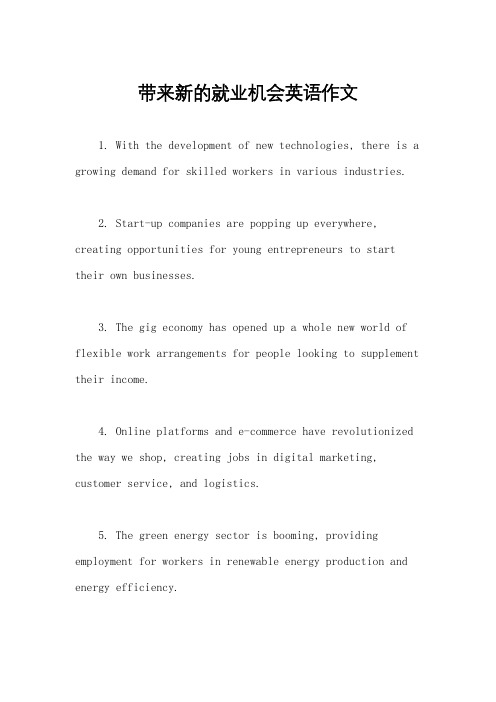
带来新的就业机会英语作文1. With the development of new technologies, there is a growing demand for skilled workers in various industries.2. Start-up companies are popping up everywhere, creating opportunities for young entrepreneurs to start their own businesses.3. The gig economy has opened up a whole new world of flexible work arrangements for people looking to supplement their income.4. Online platforms and e-commerce have revolutionized the way we shop, creating jobs in digital marketing, customer service, and logistics.5. The green energy sector is booming, providing employment for workers in renewable energy production and energy efficiency.6. The rise of the sharing economy has created opportunities for individuals to earn money by sharing their resources or skills with others.7. The healthcare industry is constantly expanding, offering a wide range of job opportunities for healthcare professionals and support staff.8. As the population ages, there is a growing need for caregivers and support workers to assist the elderly and people with disabilities.9. The entertainment industry continues to thrive, providing jobs for actors, musicians, writers, and behind-the-scenes professionals.10. Overall, the changing landscape of the job market is creating new opportunities for individuals to explore different career paths and pursue their passions.。
大学毕业生如何应对未来就业挑战英文英语作文
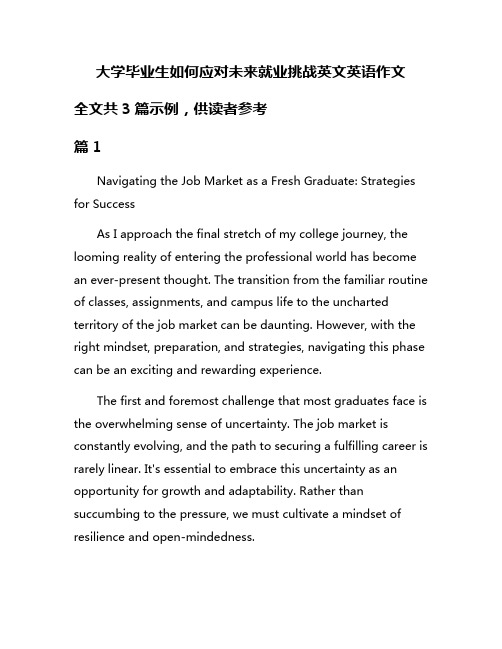
大学毕业生如何应对未来就业挑战英文英语作文全文共3篇示例,供读者参考篇1Navigating the Job Market as a Fresh Graduate: Strategies for SuccessAs I approach the final stretch of my college journey, the looming reality of entering the professional world has become an ever-present thought. The transition from the familiar routine of classes, assignments, and campus life to the uncharted territory of the job market can be daunting. However, with the right mindset, preparation, and strategies, navigating this phase can be an exciting and rewarding experience.The first and foremost challenge that most graduates face is the overwhelming sense of uncertainty. The job market is constantly evolving, and the path to securing a fulfilling career is rarely linear. It's essential to embrace this uncertainty as an opportunity for growth and adaptability. Rather than succumbing to the pressure, we must cultivate a mindset of resilience and open-mindedness.One of the keys to overcoming this hurdle is to develop a clear understanding of our strengths, interests, and values. By aligning our career aspirations with our inherent talents and passions, we increase the likelihood of finding fulfillment in our chosen field. Conducting self-assessments, seeking guidance from mentors, and exploring diverse career paths can provide valuable insights into this process.Moreover, in today's rapidly changing landscape, it's crucial to cultivate a lifelong learning mindset. The skills and knowledge acquired during our college years are merely the foundation upon which we must continuously build. Embracing the concept of continuous learning allows us to stay relevant and adaptable in an ever-evolving job market. Pursuing professional development opportunities, attending workshops, and engaging in self-study can help us stay ahead of the curve.Networking is another invaluable tool in our arsenal. Building and maintaining professional connections can open doors to opportunities that may not be readily apparent. Participating in industry events, joining professional associations, and leveraging social media platforms can facilitate connections with potential employers, mentors, and peers. Additionally, informational interviews can provide insights into differentcareer paths and offer valuable advice from seasoned professionals.While academic achievements are undoubtedly important, employers increasingly value practical experience. Internships, co-op programs, and part-time jobs provide hands-on exposure to the professional world, allowing us to develop transferable skills and gain a better understanding of the industries we are interested in. These experiences not only enhance our résumés but also demonstrate our commitment and adaptability to potential employers.In a competitive job market, standing out from the crowd is essential. Developing a compelling personal brand can help us showcase our unique talents, achievements, and perspectives. This may involve creating an online portfolio, maintaining a professional social media presence, or engaging in thought leadership activities within our chosen field.Furthermore, it's crucial to hone our job search and interview skills. Crafting a compelling résumé and cover letter tailored to each opportunity can significantly increase our chances of securing an interview. Additionally, preparing for interviews by researching the company, practicing responses to commonquestions, and seeking feedback can help us present our best selves to potential employers.Ultimately, the journey towards securing a fulfilling career is not without its challenges. Rejection and setbacks are inevitable, but they should be viewed as opportunities for growth and reflection. Maintaining a positive attitude, seeking support from our networks, and continuously refining our strategies can help us navigate these obstacles with resilience and determination.As we embark on this exciting new chapter, it's essential to remember that our career paths are not set in stone. Embracing flexibility and being open to unexpected opportunities can lead us to fulfilling careers that may not have been part of our initial plans. The key is to remain proactive, adaptable, and true to our values and aspirations.In conclusion, the transition from college to the professional world is a transformative experience that requires a combination of self-awareness, strategic planning, and a growth mindset. By embracing uncertainty, cultivating a lifelong learning mindset, building a strong network, gaining practical experience, developing a compelling personal brand, and honing our job search skills, we can navigate the challenges of the job market with confidence and resilience. The future holds boundlessopportunities for those willing to embrace the journey with an open mind and a commitment to continuous growth and adaptability.篇2Navigating the Job Market as a Fresh Graduate: A Daunting Yet Achievable MissionAs I stand at the precipice of my academic journey, the looming question of what lies ahead weighs heavily on my mind. The transition from the structured confines of university life to the ever-evolving professional landscape can be daunting, to say the least. However, with the right mindset, preparation, and resilience, navigating the job market as a fresh graduate is a challenge that can be overcome.The first and perhaps most crucial step is to cultivate a growth mindset. It's easy to fall into the trap of self-doubt and insecurity when faced with rejection or setbacks. However, it's essential to remember that every "no" brings us closer to the eventual "yes." Rejection is merely a redirection, an opportunity to refine our approach and learn from our experiences. Embracing this growth mindset allows us to view challenges as stepping stones rather than roadblocks.Networking is another invaluable tool in our arsenal. While the digital age has transformed the job search process, the power of personal connections should never be underestimated. Attend industry events, reach out to alumni, and leverage social media platforms to expand your professional circle. Building genuine relationships with those already established in your desired field can open doors to invaluable insights, advice, and potential job opportunities.Moreover, it's imperative to understand the ever-changing landscape of the job market and adapt accordingly. The skills and knowledge we've acquired during our academic years are merely the foundation upon which we must continuously build. Staying abreast of industry trends, embracing lifelong learning, and actively seeking opportunities for professional development are paramount. Whether it's enrolling in online courses, attending workshops, or seeking mentorship, investing in our personal and professional growth will undoubtedly set us apart from the competition.Adaptability and flexibility are also key attributes in today's rapidly evolving job market. While we may have envisioned a specific career path, it's crucial to remain open to alternative routes and opportunities. The ability to pivot and embracechange can open doors to unexplored avenues and allow us to capitalize on emerging trends and industries. Rigid thinking and stubbornness will only hinder our progress in an ever-changing world.Furthermore, it's essential to cultivate resilience and perseverance. The job search process can be arduous, with numerous rejections and setbacks along the way. However, it's imperative to maintain a positive mindset and unwavering determination. Each rejection is an opportunity to learn, refine our approach, and emerge stronger. Perseverance and persistence are the hallmarks of those who ultimately succeed in their endeavors.In addition to these personal attributes, it's crucial to develop a well-rounded skillset that encompasses both hard and soft skills. While technical expertise is undoubtedly valuable, employers are increasingly seeking candidates with strong communication, teamwork, and problem-solving abilities. Honing these transferable skills not only makes us more attractive to potential employers but also equips us with the tools to navigate the complexities of the modern workplace.Lastly, it's important to remember that our journey as fresh graduates is not a solitary one. Seeking guidance and supportfrom mentors, career counselors, and even our peers can provide invaluable insights and encouragement. Sharing our experiences, challenges, and successes can not only help us navigate the job market more effectively but also foster a sense of community and camaraderie among fellow graduates.In conclusion, while the path ahead may seem daunting, embracing a growth mindset, networking strategically, continuous learning, adaptability, resilience, and a well-rounded skillset can equip us with the tools necessary to navigate the job market as fresh graduates successfully. It's a journey that requires patience, perseverance, and a willingness to embrace challenges as opportunities for growth. With determination and a positive attitude, we can not only overcome the obstacles but also pave the way for a fulfilling and rewarding career.篇3Entering the Job Market as a Fresh Graduate: Navigating the Challenges AheadAs I stand at the cusp of my college journey, the exhilaration of earning a hard-won degree is tinged with a hint of trepidation. The road ahead is paved with uncertainties and challenges, but I am determined to embrace them head-on. The job market, oncea seemingly distant reality, now looms large, and it is my responsibility to equip myself with the tools necessary to navigate its ever-changing landscape.One of the most daunting challenges that fresh graduates like myself face is the intense competition for coveted entry-level positions. With countless bright minds vying for the same opportunities, it is imperative to cultivate a unique and compelling personal brand. This involves honing my skills, refining my resume, and crafting a narrative that showcases my strengths, passions, and potential contributions to prospective employers.Networking, once perceived as a mere buzzword, has now become an indispensable aspect of the job search process. Building meaningful connections within my desired industry and fostering relationships with professionals who can offer guidance and insights is paramount. Attending industry events, leveraging alumni networks, and actively engaging on professional platforms can open doors to invaluable opportunities and mentorship.Adaptability is another crucial trait that I must embrace as I venture into the workforce. The rapid pace of technological advancements and evolving market demands necessitate awillingness to continuously learn and evolve. Employers seek individuals who can seamlessly adapt to new technologies, processes, and environments, making lifelong learning an imperative. Embracing a growth mindset and actively seeking opportunities to upskill and reskill will position me as a valuable asset in any organization.Moreover, the modern workplace demands a diverse skill set that extends beyond academic prowess. Effective communication, critical thinking, problem-solving, and collaboration are highly sought-after attributes. Honing these transferable skills through extracurricular activities, internships, and hands-on projects during my college years has been invaluable preparation for the professional world.Resilience and perseverance are virtues that cannot be overstated in the face of inevitable setbacks and rejections. The job search process can be arduous and disheartening at times, but maintaining a positive attitude and unwavering determination will be key to overcoming these hurdles. Embracing constructive feedback, learning from failures, and persistently refining my approach will ultimately lead to success.Furthermore, as a fresh graduate, I recognize the importance of being financially savvy and managing my expectations.Entry-level salaries may not align with my aspirations, but viewing the initial role as a stepping stone and focusing on gaining invaluable experience will pay dividends in the long run. Developing budgeting skills, exploring cost-effective living arrangements, and maintaining a balanced lifestyle will contribute to my overall well-being and success.In addition to these personal challenges, the ever-evolving job market presents its own set of obstacles. The gig economy and remote work opportunities have disrupted traditional employment models, demanding flexibility and entrepreneurial thinking. Embracing these emerging trends and cultivating the ability to navigate the complexities of a dynamic work environment will be crucial for long-term career success.Lastly, as I embark on this journey, it is essential to maintain a sense of purpose and passion. While financial stability is undoubtedly a priority, the true fulfillment lies in finding a career path that aligns with my values, interests, and aspirations. Continuously reflecting on my goals, seeking mentorship, and being open to unconventional paths will ensure that I not only secure employment but also find meaning and satisfaction in my chosen profession.As I stand on the precipice of this new chapter, the challenges ahead may seem daunting, but they are also rife with opportunities for growth, self-discovery, and personal transformation. By embracing a mindset of resilience, adaptability, and continuous learning, I am confident in my ability to navigate the complexities of the job market and forge a rewarding and fulfilling career path. The future holds endless possibilities, and I am ready to seize them with determination and an unwavering spirit.。
高三英语未来发展预测练习题50题(答案解析)
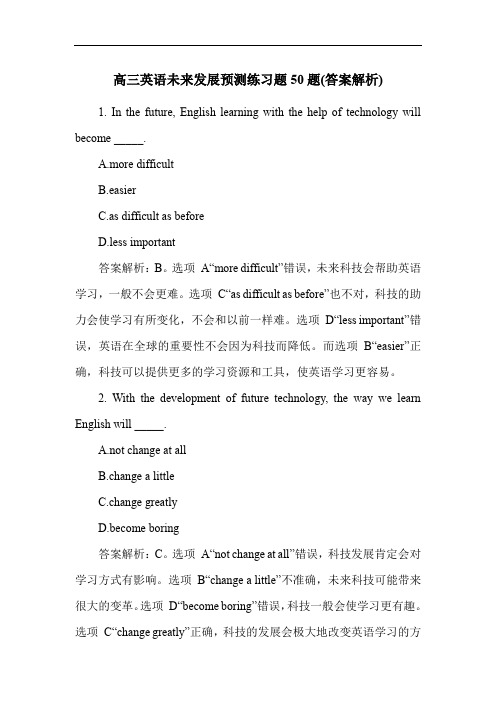
高三英语未来发展预测练习题50题(答案解析)1. In the future, English learning with the help of technology will become _____.A.more difficultB.easierC.as difficult as beforeD.less important答案解析:B。
选项A“more difficult”错误,未来科技会帮助英语学习,一般不会更难。
选项C“as difficult as before”也不对,科技的助力会使学习有所变化,不会和以前一样难。
选项D“less important”错误,英语在全球的重要性不会因为科技而降低。
而选项B“easier”正确,科技可以提供更多的学习资源和工具,使英语学习更容易。
2. With the development of future technology, the way we learn English will _____.A.not change at allB.change a littleC.change greatlyD.become boring答案解析:C。
选项A“not change at all”错误,科技发展肯定会对学习方式有影响。
选项B“change a little”不准确,未来科技可能带来很大的变革。
选项D“become boring”错误,科技一般会使学习更有趣。
选项C“change greatly”正确,科技的发展会极大地改变英语学习的方式。
3. In the future, technology is likely to make English learning _____.A.more time-consumingB.less effectiveC.more enjoyableD.more expensive答案解析:C。
选项A“more time-consuming”错误,科技通常会提高效率,减少学习时间。
关于未来职业变化需求的英文语篇
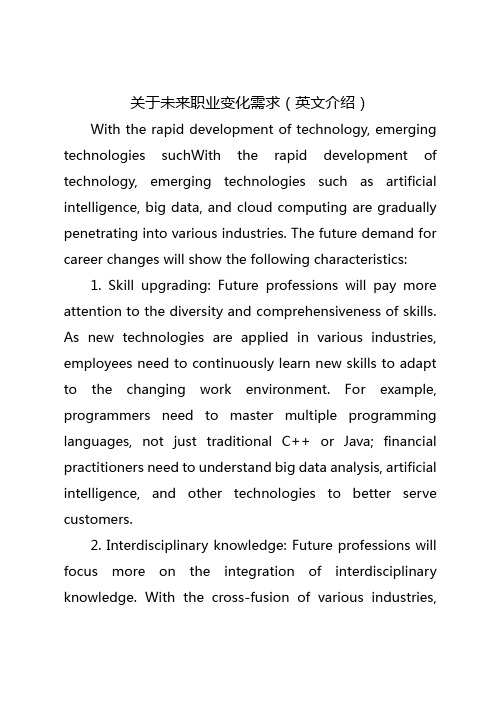
关于未来职业变化需求(英文介绍)With the rapid development of technology, emerging technologies suchWith the rapid development of technology, emerging technologies such as artificial intelligence, big data, and cloud computing are gradually penetrating into various industries. The future demand for career changes will show the following characteristics:1. Skill upgrading: Future professions will pay more attention to the diversity and comprehensiveness of skills. As new technologies are applied in various industries, employees need to continuously learn new skills to adapt to the changing work environment. For example, programmers need to master multiple programming languages, not just traditional C++ or Java; financial practitioners need to understand big data analysis, artificial intelligence, and other technologies to better serve customers.2. Interdisciplinary knowledge: Future professions will focus more on the integration of interdisciplinary knowledge. With the cross-fusion of various industries,employees need to have a multi-disciplinary knowledge system to better exert synergistic effects in their work. For example, healthcare practitioners need to understand biology, chemistry, physics, and other disciplines to provide personalized treatment plans for patients.3. Innovation ability: In the fierce market competition, innovation ability will become an important competitiveness for employees. Future professions will pay more attention to employees' innovative thinking and entrepreneurial spirit, encouraging them to dare to challenge tradition and explore the unknown. For example, companies will attach more importance to employees' creative proposals and provide more support and resources for employees with innovative ideas.4. Interpersonal communication skills: Although artificial intelligence technology can replace humans in many aspects, machines still cannot completely replace humans in interpersonal communication. Therefore, future professions will pay more attention to employees' interpersonal communication skills, including listening,expression, coordination, and other skills.5. Self-learning ability: In a rapidly changing professional environment, employees need to have the ability to self-learn so that they can update their knowledge and skills at any time. Future professions will pay more attention to employees' self-drive and self-management abilities, encouraging them to actively seek opportunities for learning and growth.6. Adaptability: Facing the uncertainty of future professions, employees need to have strong adaptability so that they can find their own position in the constantly changing environment. This includes the acceptance ability of new technologies, curiosity about new things, and the ability to cope with change.In summary, future career changes will pay more attention to employees' comprehensive quality and ability. In this era full of challenges and opportunities, we need to constantly improve ourselves to meet the development needs of future professions.翻译:随着科技的飞速发展,人工智能、大数据、云计算等新兴技术逐渐渗透到各个行业,未来职业的变化需求将呈现出以下特点:1. 技能升级:未来的职业将更加注重技能的多样性和综合性。
科技发展我们应该做英语作文
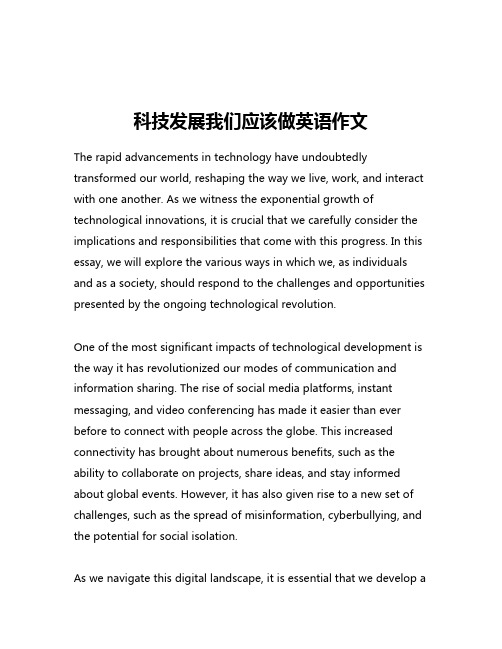
科技发展我们应该做英语作文The rapid advancements in technology have undoubtedly transformed our world, reshaping the way we live, work, and interact with one another. As we witness the exponential growth of technological innovations, it is crucial that we carefully consider the implications and responsibilities that come with this progress. In this essay, we will explore the various ways in which we, as individuals and as a society, should respond to the challenges and opportunities presented by the ongoing technological revolution.One of the most significant impacts of technological development is the way it has revolutionized our modes of communication and information sharing. The rise of social media platforms, instant messaging, and video conferencing has made it easier than ever before to connect with people across the globe. This increased connectivity has brought about numerous benefits, such as the ability to collaborate on projects, share ideas, and stay informed about global events. However, it has also given rise to a new set of challenges, such as the spread of misinformation, cyberbullying, and the potential for social isolation.As we navigate this digital landscape, it is essential that we develop acritical understanding of the role of technology in our lives. We must be mindful of the potential pitfalls and actively work to cultivate healthy digital habits. This may involve setting boundaries around screen time, being discerning consumers of online content, and actively engaging in face-to-face interactions to maintain a balanced and fulfilling social life.Another crucial aspect of our response to technological development is the need to ensure that the benefits of these advancements are equitably distributed. The digital divide, which refers to the gap between those who have access to technology and those who do not, can perpetuate existing socioeconomic disparities and limit opportunities for marginalized communities. It is our responsibility as a society to work towards bridging this divide, through initiatives such as improving internet access in underserved areas, providing digital literacy education, and advocating for policies that promote digital inclusion.Furthermore, as technology continues to shape our lives, we must also grapple with the ethical implications of its use. The development of artificial intelligence, automation, and data-driven decision-making has raised concerns about issues such as job displacement, privacy infringement, and the potential for bias and discrimination. It is crucial that we engage in ongoing dialogues and policymaking to ensure that technological progress is guided by principles of fairness,transparency, and accountability.In the realm of education, technology has opened up new avenues for learning and knowledge acquisition. Online courses, educational apps, and virtual classrooms have the potential to democratize access to education and provide personalized learning experiences. However, we must also be mindful of the potential pitfalls, such as the risk of digital distractions, the need for digital literacy skills, and the importance of maintaining human interaction and hands-on learning experiences.Finally, as we confront the pressing challenges of our time, such as climate change and global health crises, we must leverage the power of technology to develop innovative solutions. From renewable energy technologies to advancements in medical research, the potential of technology to address these complex issues is immense. Yet, we must also ensure that the development and deployment of these technologies are guided by a deep understanding of their environmental and social impacts, and a commitment to sustainability and responsible innovation.In conclusion, the rapid pace of technological development presents both opportunities and challenges. As we navigate this transformative era, it is crucial that we approach technology with a critical and thoughtful mindset. We must work to harness thebenefits of technological progress while mitigating its potential harms, ensuring that the fruits of innovation are equitably distributed, and that our technological future is guided by principles of ethics, inclusion, and sustainability. By doing so, we can unlock the full potential of technology to improve the human condition and create a more just, resilient, and prosperous world for all.。
有点东西不会在未来出现英语作文
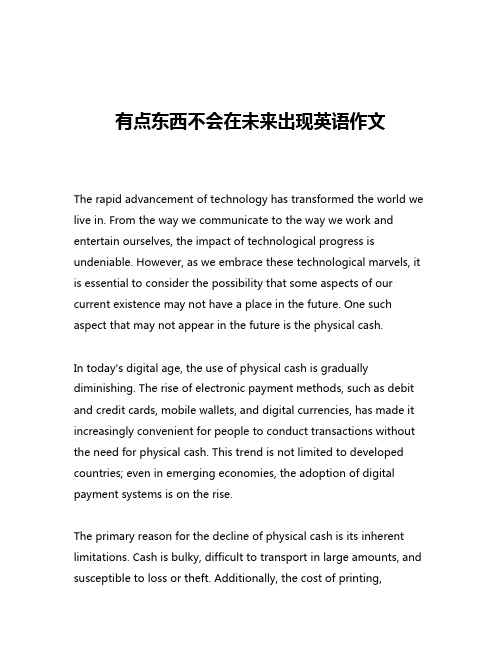
有点东西不会在未来出现英语作文The rapid advancement of technology has transformed the world we live in. From the way we communicate to the way we work and entertain ourselves, the impact of technological progress is undeniable. However, as we embrace these technological marvels, it is essential to consider the possibility that some aspects of our current existence may not have a place in the future. One such aspect that may not appear in the future is the physical cash.In today's digital age, the use of physical cash is gradually diminishing. The rise of electronic payment methods, such as debit and credit cards, mobile wallets, and digital currencies, has made it increasingly convenient for people to conduct transactions without the need for physical cash. This trend is not limited to developed countries; even in emerging economies, the adoption of digital payment systems is on the rise.The primary reason for the decline of physical cash is its inherent limitations. Cash is bulky, difficult to transport in large amounts, and susceptible to loss or theft. Additionally, the cost of printing,distributing, and maintaining physical currency can be a significant burden for governments and financial institutions. In contrast, digital payment methods offer a more efficient and secure alternative, with features like instant fund transfers, reduced fraud risk, and improved record-keeping.Moreover, the COVID-19 pandemic has further accelerated the shift towards cashless transactions. The fear of handling physical cash, which can potentially harbor germs and viruses, has led many people to opt for contactless payment methods. This shift has been particularly evident in the retail and service industries, where businesses have actively encouraged customers to use digital payment options to minimize physical contact and reduce the risk of virus transmission.The rise of mobile banking and digital wallets has also contributed to the declining use of physical cash. These technologies allow users to manage their finances, make payments, and even access financial services from the convenience of their smartphones. This level of convenience and accessibility has made it increasingly unnecessary for individuals to carry large amounts of physical cash.Furthermore, the introduction of central bank digital currencies (CBDCs) by various governments around the world has the potential to further marginalize the role of physical cash. CBDCs are digitalversions of national currencies, designed to provide a secure and efficient alternative to traditional fiat money. These digital currencies can be easily transferred, stored, and used for transactions, making them a more appealing option for both individuals and businesses.The potential benefits of a cashless society extend beyond just convenience and efficiency. A reduction in the use of physical cash can also have positive implications for the environment. The production, distribution, and disposal of physical currency consume significant resources, including energy, paper, and ink. By transitioning to digital payment methods, the environmental impact associated with the lifecycle of physical cash can be significantly reduced.Additionally, a cashless society can aid in the fight against illicit activities, such as money laundering, tax evasion, and the financing of criminal organizations. Digital payment systems provide a more transparent and traceable record of transactions, making it easier for authorities to monitor and detect suspicious activities.However, it is important to acknowledge that the complete elimination of physical cash may not be feasible or desirable in the near future. There are still segments of the population, particularly in developing countries and among certain demographic groups, who rely on physical cash for their daily transactions. These individualsmay not have access to or be comfortable with digital payment methods, and the sudden removal of physical cash could create significant challenges for them.Additionally, there are concerns about the potential risks associated with a fully cashless society. The over-reliance on digital payment systems could make the financial system more vulnerable to cyber attacks, system failures, and power outages. Furthermore, the lack of physical cash could limit the financial autonomy and privacy of individuals, as their transactions would be subject to greater scrutiny and control by authorities and financial institutions.In conclusion, while the use of physical cash may diminish in the future, it is unlikely that it will disappear entirely. The transition towards a more digital payment landscape will likely be a gradual process, with a continued coexistence of physical and digital payment methods. As we embrace this technological evolution, it is crucial to address the concerns and challenges associated with a cashless society, ensuring that the transition is inclusive, secure, and beneficial for all members of the population.。
如何在未来找到一份好工作英语作文
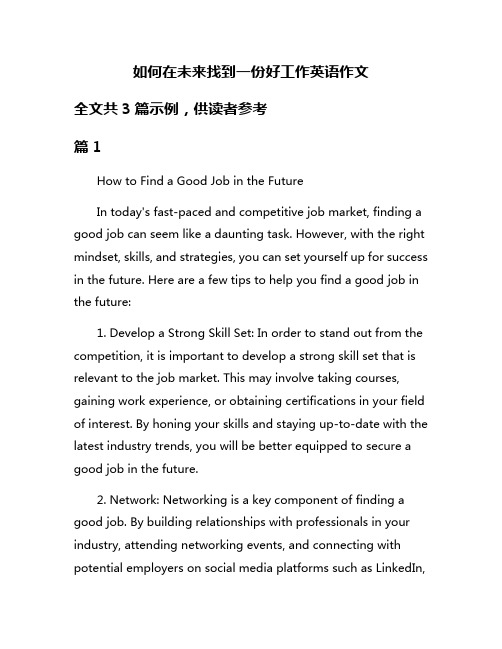
如何在未来找到一份好工作英语作文全文共3篇示例,供读者参考篇1How to Find a Good Job in the FutureIn today's fast-paced and competitive job market, finding a good job can seem like a daunting task. However, with the right mindset, skills, and strategies, you can set yourself up for success in the future. Here are a few tips to help you find a good job in the future:1. Develop a Strong Skill Set: In order to stand out from the competition, it is important to develop a strong skill set that is relevant to the job market. This may involve taking courses, gaining work experience, or obtaining certifications in your field of interest. By honing your skills and staying up-to-date with the latest industry trends, you will be better equipped to secure a good job in the future.2. Network: Networking is a key component of finding a good job. By building relationships with professionals in your industry, attending networking events, and connecting with potential employers on social media platforms such as LinkedIn,you can increase your chances of finding a job that is a good fit for you. Additionally, networking can help you uncover hidden job opportunities that may not be advertised publicly.3. Research Companies: Before applying for a job, it is important to research the company and understand its culture, values, and mission. By doing so, you can determine if the company is a good fit for you and tailor your application to showcase how you can contribute to its success. Additionally, researching companies can help you prepare for interviews and impress potential employers with your knowledge of their organization.4. Build a Strong Online Presence: In today's digital age, having a strong online presence is essential for finding a good job. Create a professional LinkedIn profile, showcase your skills and experiences on your personal website or portfolio, and engage with industry-related content on social media platforms. By building a strong online presence, you can attract the attention of potential employers and demonstrate your expertise in your field.5. Be Flexible: Flexibility is key when it comes to finding a good job in the future. Be open to exploring different job opportunities, industries, and locations, as this can increase yourchances of finding a job that is a good fit for you. Additionally, be willing to adapt to changing market conditions and be proactive in seeking out new opportunities that align with your skills and interests.In conclusion, finding a good job in the future requires hard work, dedication, and the right strategies. By developing a strong skill set, networking, researching companies, building a strong online presence, and being flexible, you can set yourself up for success in the job market. Remember to stay positive, motivated, and proactive in your job search, and you will be well on your way to finding a good job in the future.篇2How to Find a Good Job in the FutureIn today's rapidly changing job market, finding a good job can be a daunting task. With the rise of automation and technology, the job landscape is constantly evolving, making it crucial for individuals to adapt and stay ahead of the curve in their job search. Here are some tips on how to find a good job in the future:1. Develop in-demand skills: In order to stand out to employers, it is important to have skills that are in high demand.This might include technical skills such as coding, data analysis, or digital marketing, as well as soft skills like communication, problem-solving, and adaptability. Keeping up with industry trends and continuously learning new skills will make you a more attractive candidate to potential employers.2. Network: Networking is a key component of any job search. Building relationships with industry professionals, attending networking events, and utilizing social media platforms like LinkedIn can help you connect with potential employers and learn about job opportunities in your field. Additionally, don't be afraid to reach out to people in your network for advice and referrals.3. Pursue internships and work experience: Gaining practical experience through internships, part-time jobs, or volunteer work can help you build your resume and demonstrate your skills to potential employers. It can also provide valuable insights into different industries and help you determine the type of job you want to pursue in the future.4. Build a strong personal brand: In today's digital age, having a strong personal brand is essential for job seekers. This might include creating a professional online presence, showcasing your work through a personal website or onlineportfolio, and maintaining a positive and professional social media presence. Employers often look at candidates' online profiles, so it's important to make a good impression.5. Stay flexible and open-minded: The job market is constantly changing, and it's important to stay open-minded and flexible in your job search. Consider exploring different industries, job roles, and locations to increase your chances of finding a good job. Additionally, be willing to adapt to new technologies and work environments, as the job market continues to evolve.Overall, finding a good job in the future requires a combination of hard work, perseverance, and adaptability. By developing in-demand skills, networking, gaining work experience, building a strong personal brand, and staying flexible in your job search, you can increase your chances of finding a job that aligns with your goals and aspirations. Remember to stay positive and proactive in your job search, and don't be afraid to seek help and guidance from others along the way. Good luck!篇3How to Find a Good Job in the FutureFinding a good job in the future may seem like a daunting task, but with the right approach and mindset, it is entirely possible to secure a rewarding and fulfilling career. In this article, we will discuss some strategies and tips on how to navigate the job market and make the most of your potential opportunities.1. Invest in Your Education and SkillsOne of the best ways to ensure that you are competitive in the job market is to invest in your education and skills. Consider pursuing a higher degree or certification in your field of interest, as this will not only enhance your knowledge but also demonstrate to potential employers that you are committed to professional development.Additionally, make an effort to continuously improve and update your skillset. Attend workshops, seminars, and training programs to stay abreast of industry trends and advancements. The more knowledgeable and skilled you are, the more marketable you will be to employers.2. Network, Network, NetworkNetworking is a crucial component of finding a good job. Make an effort to establish connections with professionals in your field by attending industry events, joining professionalassociations, and reaching out to individuals for informational interviews. Networking not only allows you to learn about job opportunities but also helps you build relationships that can lead to future career prospects.Utilize social media platforms such as LinkedIn to connect with professionals in your industry and showcase your expertise and achievements. Engage with potential employers by commenting on their posts, sharing relevant articles, and participating in online discussions. Remember, networking is a two-way street, so be sure to offer help and support to others as well.3. Stay Current and FlexibleIn today's rapidly changing job market, it is essential to stay current with industry trends and adapt to new technologies and practices. Keep an eye out for emerging job opportunities and be open to exploring different career paths and roles. The ability to be flexible and adaptable will not only enhance your marketability but also increase your chances of finding a job that aligns with your interests and skills.Consider taking on freelance or part-time work to gain valuable experience and establish a track record of success. This can help you build a portfolio of work and demonstrate yourabilities to potential employers. Additionally, freelance work can lead to full-time employment opportunities and provide you with the flexibility to explore different job options.4. Develop a Strong Personal BrandIn today's competitive job market, it is essential to differentiate yourself from other candidates by developing a strong personal brand. Your personal brand encompasses your values, skills, and achievements and should communicate your unique selling points to potential employers.Create a professional online presence by developing a personal website or blog that showcases your work, achievements, and expertise. Utilize social media platforms to share valuable content, engage with your audience, and demonstrate your knowledge in your field. Consider creating a professional portfolio that highlights your best work and conveys your skills and abilities effectively.5. Seek Mentorship and GuidanceFinding a good job can be a challenging and overwhelming process, but you don't have to navigate it alone. Seek out mentorship and guidance from experienced professionals in your field who can offer valuable advice, insights, and support. Amentor can provide you with valuable feedback, help you set goals, and connect you with potential job opportunities.Consider joining mentorship programs offered by professional organizations or universities, or reaching out to individuals in your network who have experience in your desired field. Be proactive in seeking out mentorship opportunities and be open to feedback and guidance. A mentor can help you navigate the job market and provide you with the tools and resources you need to succeed.In conclusion, finding a good job in the future requires a combination of education, skills, networking, flexibility, personal branding, and mentorship. By investing in your development, staying current with industry trends, building relationships, and differentiating yourself from other candidates, you can increase your chances of securing a rewarding and fulfilling career. Remember to stay persistent, patient, and proactive in your job search, and you will eventually find a job that aligns with your goals and aspirations.。
- 1、下载文档前请自行甄别文档内容的完整性,平台不提供额外的编辑、内容补充、找答案等附加服务。
- 2、"仅部分预览"的文档,不可在线预览部分如存在完整性等问题,可反馈申请退款(可完整预览的文档不适用该条件!)。
- 3、如文档侵犯您的权益,请联系客服反馈,我们会尽快为您处理(人工客服工作时间:9:00-18:30)。
Latest (4-May) : 684.8
450 400 350 300 250 200
May-05 May-06 Mar-05 Mar-06 Sep-05 Sep-06 Mar-07
Apr,05
Apr,06
Palladium Pre-plated Frame Pre-plated
镍钯金预电镀框架
Increasing demand 渐成主流
Support green packaging (lead-free) 滿足 ’无铅’ 环保要求 Lower assembly cost due to elimination of solder plating process 省去封装过程中的镀锡工序从而进一步降低封装成本
公用模具的领先者
SOJ SC70
Low Cost
TQFP 14x14 PDIP SOT23 TSSOP TQFP 14x20
TSOP(I) SOP MSOP SSOP
ASM Pacific Technology Ltd. © 2007
Open Tool Advantages
公用模具的优势
• Save cost in expensive precision tooling 节省模具的开发费用 • Low leadframe cost due to economy of scale 规模效益可降低引線框架的制造成本 • Short delivery lead time due to common parts in production 主流产品的交货周期较短 • Perfection in leadframe design as tuned by various customers 吸纳不同客户的反馈使引线框架的设计力臻 完美
ASM Pacific Technology Ltd. © 2007
New Platform For Small Package
小型封裝件的最新框架设计
Standard frame size 70x238mm, easy conversion 统一的框架外形尺寸, 方便产品转换
SO 8L (256unit)
Low Cost
Leadframe base metal
ASM Pacific Technology Ltd. © 2007
Thin Plating Measurement
薄钯电镀层的测量
State-of-the-art capability
顶级的测量能力 Good resolution 微细的分辨率 2.5Å (0.01µ”) Good accuracy 微细的精确度 10nm Pd at +/- 12.5Å 10 纳米厚度的钯层 VXR (精准度达 +/- 0.8纳米) Good applicability 灵活的应用范围 Measurement area 75nm, i.e. any spot on the lead surface 测量区域 > 75纳米,也就是脚表面的任何位置
Vs typical design 140units 与普通型比较 Density 密度: +83% Material consumption: -21% 材料耗用
Low Cost
MSOP 8L/10L (320unit)
Vs typical design 100units 与普通型比较 Density 密度: +220% Material consumption: -51% 材料耗用
Source: IC Packaging Materials 2006 Edition
2009
2010
ASM Pacific Technology Ltd. © 2007
Typical Plating Scheme
典型的电镀规格
3-layer structure (Ni/Pd/Au) 三层结构(镍/钯/金) Pd at min 20nm (0.8µ”) 钯厚度最少20纳米
70000 60000 50000 Units (M)
Low Cost
Leadframe Finish Forecast
Pd PPF
40000 30000 20000 10000 0 2005 2006 2007 Year 2008
Ni/Pd/Au PPF Sn/Pb Matte Tin Sn/Bi Sn/Ag/Cu Sn/Cu
Low Cost
ASM Pacific Technology Ltd. © 2007
High Density Matrix
高密度矩阵
SO 8L (256unit)
Low Cost
TSSOP / MSOP 8L (320unit)
TQFP (7x7) 48L (60unit)
QFN 3L - MCD (8,816unit)
Latest (4-May): 8225.0
Latest (4-May): 52,600
50,000 40,000 30,000 20,000 10,000 Nov-05 Nov-06 Jan-05 Jul-05 Jan-06 Jul-06 Mar-05 Mar-06 Jan-07 May-05 May-06 Sep-05 Sep-06 Mar-07
Shipment (Million Units)
Low Cost
Cumulative Production
Close to 1 billion units!
Oct,05
Feb,05
Feb,06
Mar,05
Mar,06
May,05
May,06
Nov,05
Dec,05
Oct,06
Jan,06
Jun,06
Jul,06
Nov,06
June,05
ASM Pacific Technology Ltd. © 2007
Sep, பைடு நூலகம்6
Aug,05
Aug,06
Dec,06
July,05
Sep,05
1000 900 800 700 600 500 400 300 200 100 0
Start launching to market
ASM Pacific Technology Ltd. © 2007
Power Device
功率器件
较厚的原材料厚度可加快热量的扩散
Thick material (0.50mm) to enhance thermal dissipation
Application Specific
ASM Pacific Technology Ltd. © 2007
内脚反向打凹的产品
Using lead up-bending (reverse downset) to simulate half-material-thickness feature of etched frame 模拟腐蚀片中半腐蚀的特性,将内脚反向打凹 Increasing inquiry with diversified pkg designs 应用于不同的封装类形 TEP 5L DFN 6L
Low Cost
DFN 8L
ASM Pacific Technology Ltd. © 2007
Application Specific 特殊应用
ASM Pacific Technology Ltd. © 2007
Flip Chip Device Forecast
倒装芯片封装体的预测
Application Specific
Trend of LME Nickel Price
60,000
8,000 7,000 6,000 5,000 4,000 3,000 2,000 1,000 May-05 May-06 Mar-05 Mar-06 Nov-05 Nov-06 Sep-05 Sep-06 Mar-07 Jan-05 Jan-06 Jan-07 Jul-05 Jul-06
Leadframe Development For Future Needs
引线框架的未来发展
ASM Pacific Technology Ltd. © 2007
Electronic Component Packaging Needs
芯片封装件的需求
Low Cost 低成本 High Performance 高性能 Application Specific 特殊应用
Series1
Jul-05
Nov-05
Jul-06
Nov-06
Jan-05
Jan-06
Month
Series1
M onth
ASM Pacific Technology Ltd. © 2007
Jan-07
Low Cost 低成本
ASM Pacific Technology Ltd. © 2007
Open Tool Leader
TSSOP 8L (320unit)
Vs typical design 100units 与普通型比较 Density 密度: +220% Material consumption: -51% 材料耗用
ASM Pacific Technology Ltd. © 2007
Field Proven By Volume Production SO 8L 256units
散热型封装件的预测
Low Cost
Source: IC Packaging Materials 2006 Edition
